Turning Promise into Progress: Strategic Pathways for Animal Welfare Reform in the European Union
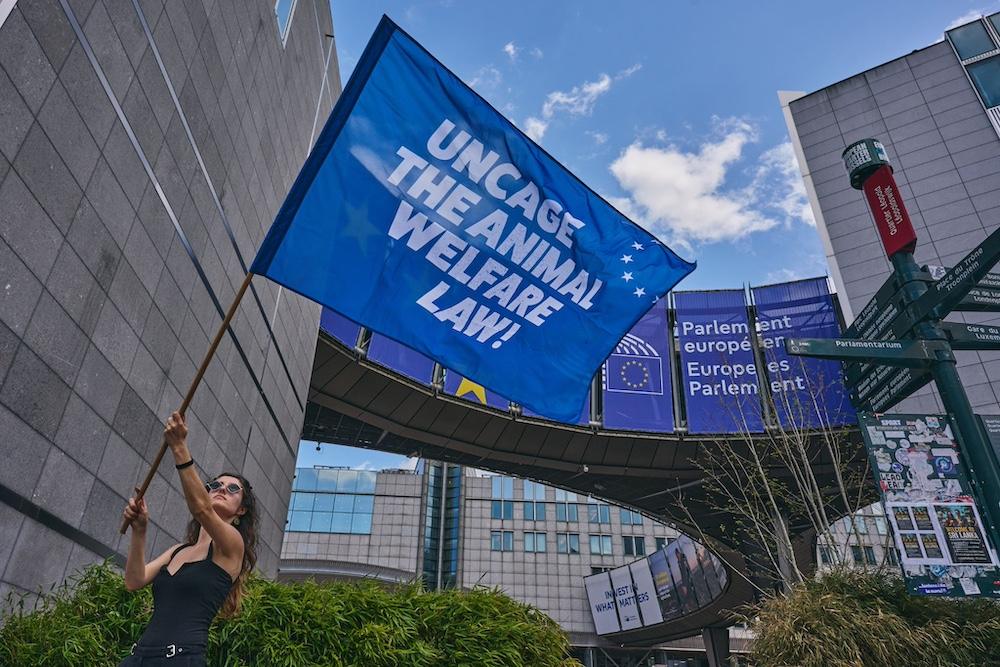
This is a guest blog post. All opinions are that of the guest blogger.
Right now, 300 million farmed animals across the European Union are confined to cages1. As the world’s third-largest meat producer2, the EU accounts for approximately 8% of all land animals slaughtered globally,3 with farms rearing 74 million cows, 133 million pigs, 68 million sheep and goats, and several billions birds in 2023.4 Beyond domestic consumption, the EU is also a major participant in international trade, with 1.6 billion live animals transported among member states, and to or from non-EU countries, between 2017 and 2021.5
Today, the EU stands on the brink of a historic opportunity to transform its animal welfare legislation into the most advanced in the world. Following a missed opportunity in late 2023, a new political window has opened for significant reforms, including the phase-out of cages and the ban on systematic killing of chicks and ducklings.
The current scale of cage confinement remains extensive. As of 2024, approximately 38% of the EU’s laying hens (155 million hens) are still housed in cages. The situation is more severe for other species: an estimated 94% of farmed rabbits (72 million individuals) and 96% of breeding sows (10 million pigs) are kept in confined conditions for much of their lives.6
Animals in cages are extremely constrained and often have little to no opportunity to express their natural behaviours. Hens are unable to dust-bathe, perch, forage or fully spread their wings; rabbits cannot hop or dig; and sows are frequently kept in stalls so small they cannot even turn around and take proper care of their piglets. In many cases, these cages are overcrowded, leading to increased stress, aggression, and the spread of disease.7 In other instances, animals may be housed in isolation and deprived of essential social interaction. The European Food Safety Authority, the EU’s central scientific body, has itself recommended ending cage use for breeding hens, ducks, geese, quails, and sows in its latest reports.8
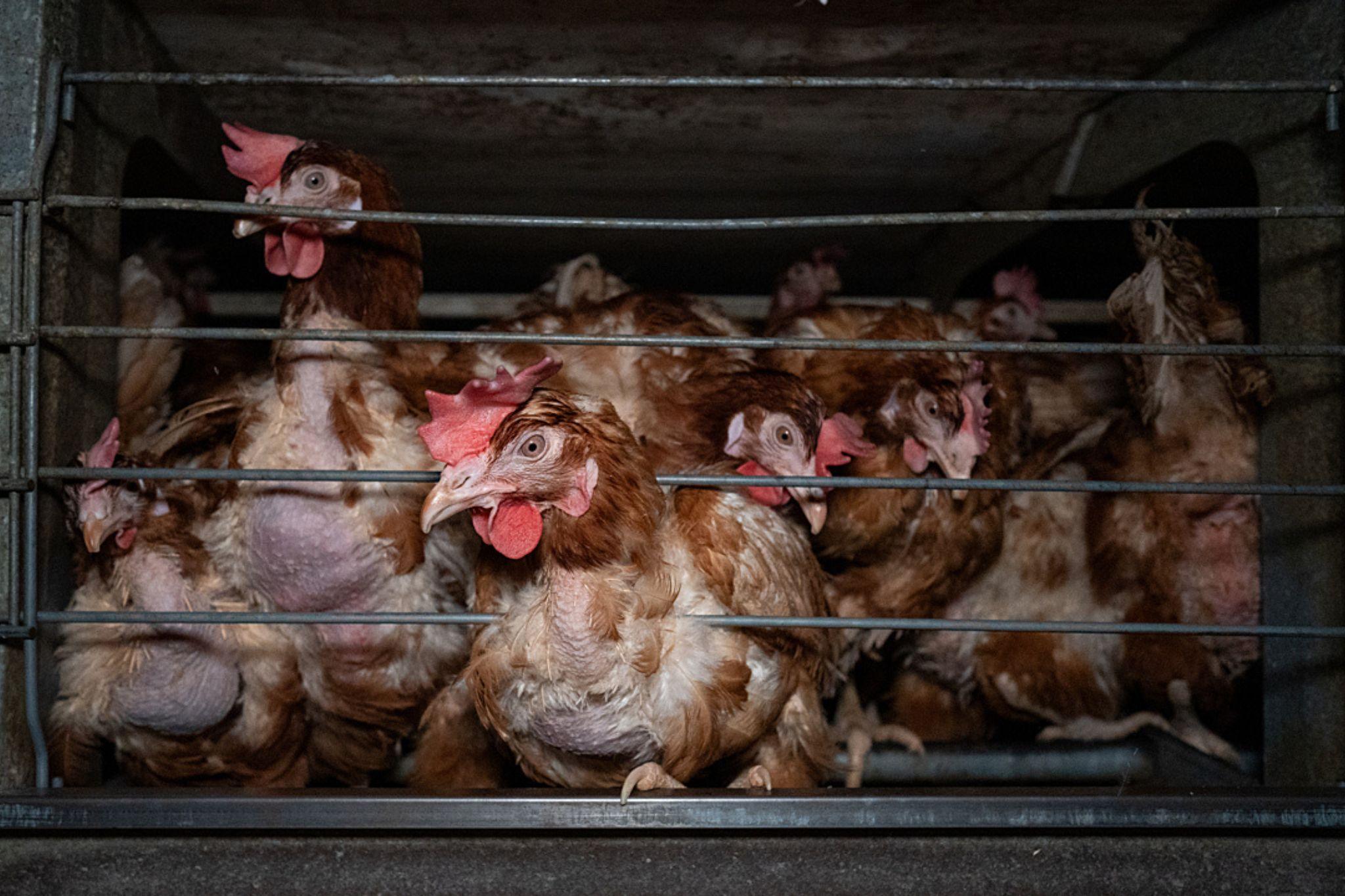
Credit: Bogna Wiltowska / Anima International / Open Wing Alliance / We Animals.
These practices not only raise serious ethical concerns within the EU but also underscore the Union’s responsibility to drive change well beyond its borders. The EU has a particular ability to exert such influence due to what is known as the “Brussels Effect.” Due to the EU’s vast market and regulatory influence, stricter standards adopted within the EU often ripple outward, prompting global producers to raise their standards to maintain access to European consumers. In particular, introducing mirror clauses, which require imported products to comply with the same standards as those enforced within the EU, could be a powerful means of improving animal welfare internationally. Such measures may also help bridge the interests of farmers and animal advocates, since they would ensure that farmers are not exposed to competition from less regulated markets9.
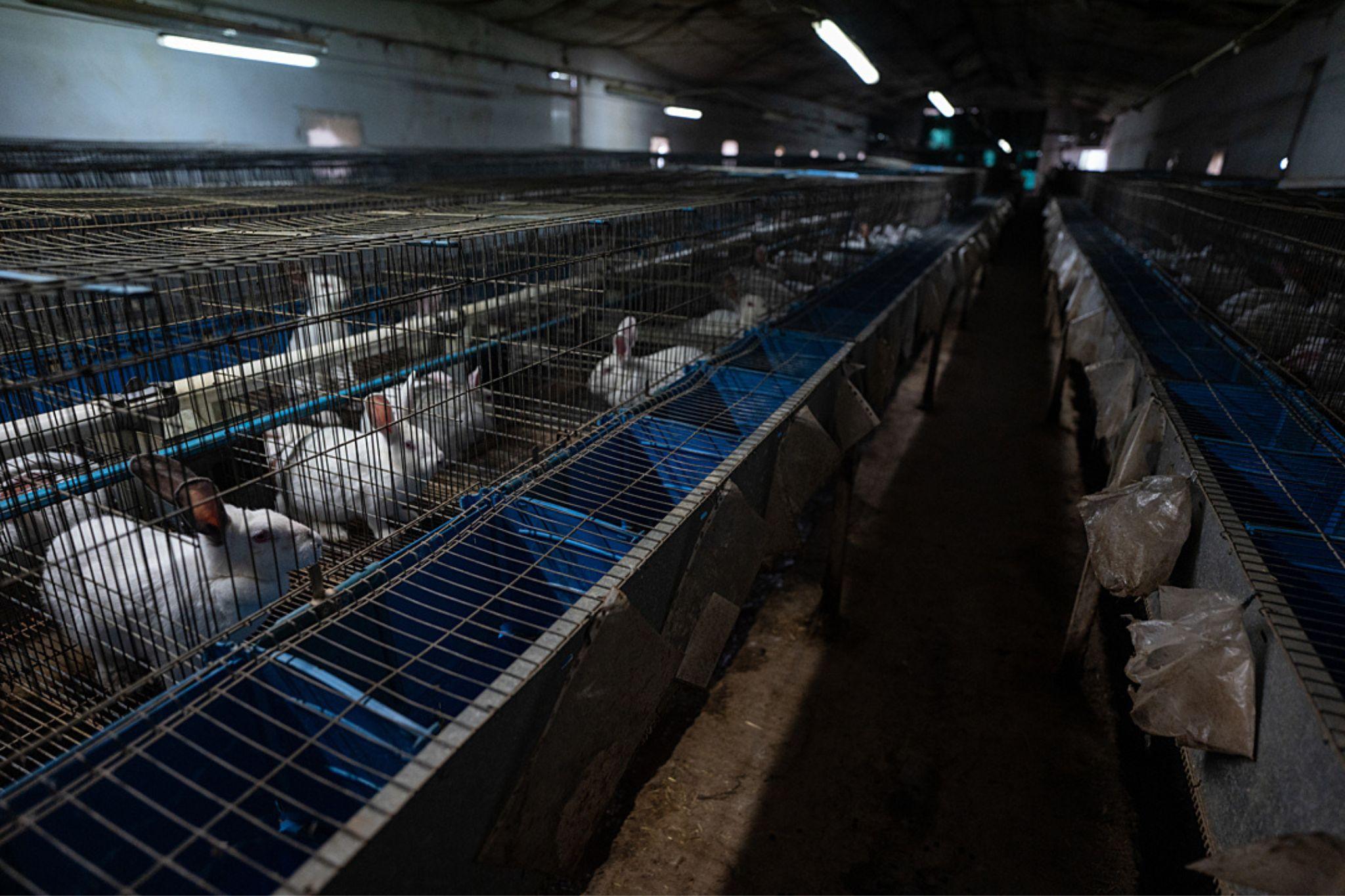
Credit: Bogna Wiltowska / Anima International / Open Wing Alliance / We Animals.
European advocates are mobilizing to meet the challenge. They are active at various levels, in Brussels and across their home countries, working through the Eurogroup for Animals and forming ad hoc coalitions. Multiple campaigns are pressuring European Institutions for ambitious legislation: ActForAnimals.eu10 led by Animal Society, #ForwardForAnimals11 led by the Eurogroup for Animals, and Uncage The Law12 coordinated by the L214 with eight partner organizations. Given the scarcity of resources, the magnitude of the stakes, and this narrow window of opportunity, we, as a movement, must think strategically and act accordingly. That is why, in 2024 and 2025, Animal Society has consulted with advocates, experts, and journalists, and completed an extensive literature review to draw lessons from past experiences and help strengthen the movement’s effectiveness.

Credit: Camille Martins.
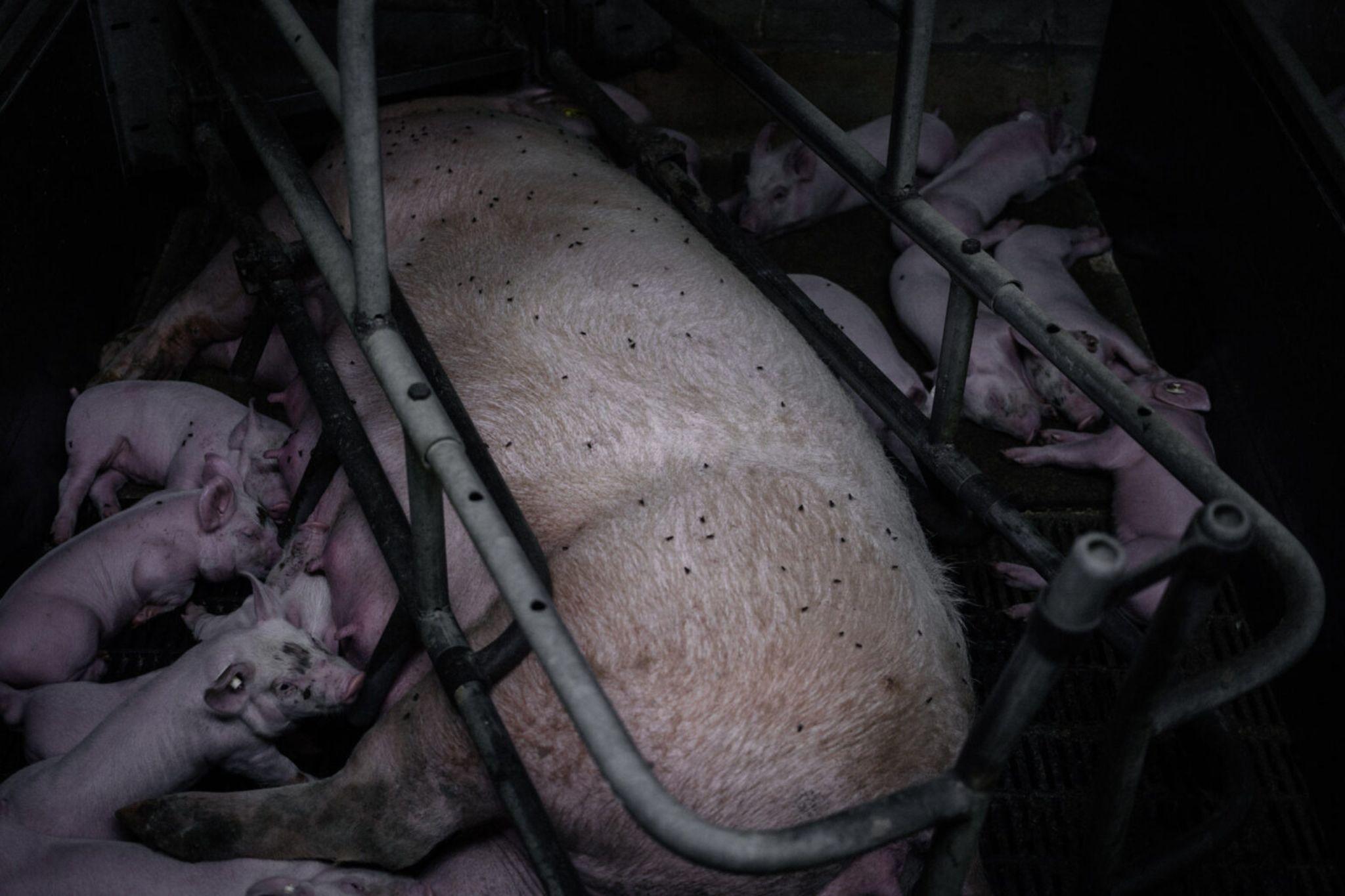
The Road to Reform.
The EU’s journey toward a more sustainable and ethical food system tells a story of unprecedented citizen mobilization and initial political commitments, followed by unexpected delays and missed deadlines. This timeline shows how a historic opportunity for change has stalled despite overwhelming public support.
September 2018
- “End the Cage Age” Campaign Launches This European Citizen Initiative unites 100+ organizations to end caged farming across the EU.13 ECI’s are a mechanism that enables EU citizens to propose legislative changes to the European Commission if they gather at least one million signatures from across Member states.14
December 2019
- European Green Deal Unveiled EU Commission presents ambitious roadmap for climate neutrality by 2050 and sustainable economy transition.15 A core component of this vision is the Farm to Fork Strategy.
May 2020
- Farm to Fork Strategy Launched Comprehensive food system reform targeting pesticide reduction, organic farming expansion, and improved animal welfare.16
October 2020
- 1.4 Million Signatures Delivered “End the Cage Age” becomes one of the most successful European Citizen Initiatives, demonstrating unprecedented public support for animal welfare reform.
April 2021
- Parliamentary Hearing Campaign organizers present their case to the European Parliament in public session.
June 2021
- Parliament Backs Cage Ban The European Parliament adopts resolution endorsing gradual end to caged farming and calling for legislative action.17
- Commission Commitment In response to the ECI, the European Commission pledges to table a legislative proposal by the end of 2023 to: phase out cages by 2027, extend the caged-free requirement to imported products, and to provide incentives and financial support to European farmers.
Summer 2023
- Warning Signs Rumors circulate that welfare revision might be delayed or dropped from legislative agenda.
September 2023
- Missing from Work Program Commission President Ursula von der Leyen fails to mention animal welfare revision in 2024 Work Program, fueling speculation about a loss of political will.
December 2023
- Deadline Missed European Commission fails to deliver promised legislation by year-end deadline.
March 2024
- Legal Challenge Animal organizations take the European Commission to the European Court of Justice. This is the first legal action over failure to act on a successful ECI.
January 2024
- Strategic Dialogue Begins In parallel, the European Commission launches talks with 29 representatives from farming, industry, NGOs, finance, and academia on EU agriculture’s future.18
February 2025
- New Vision Emerges Strategic Dialogue produces “Vision for Agriculture and Food,” emphasizing legislative reform and aiming to improve the competitiveness and fairness of European food production, including the revision of animal welfare laws, such as the phasing out of cages and the alignment of standards for imported products to those produced within the EU.
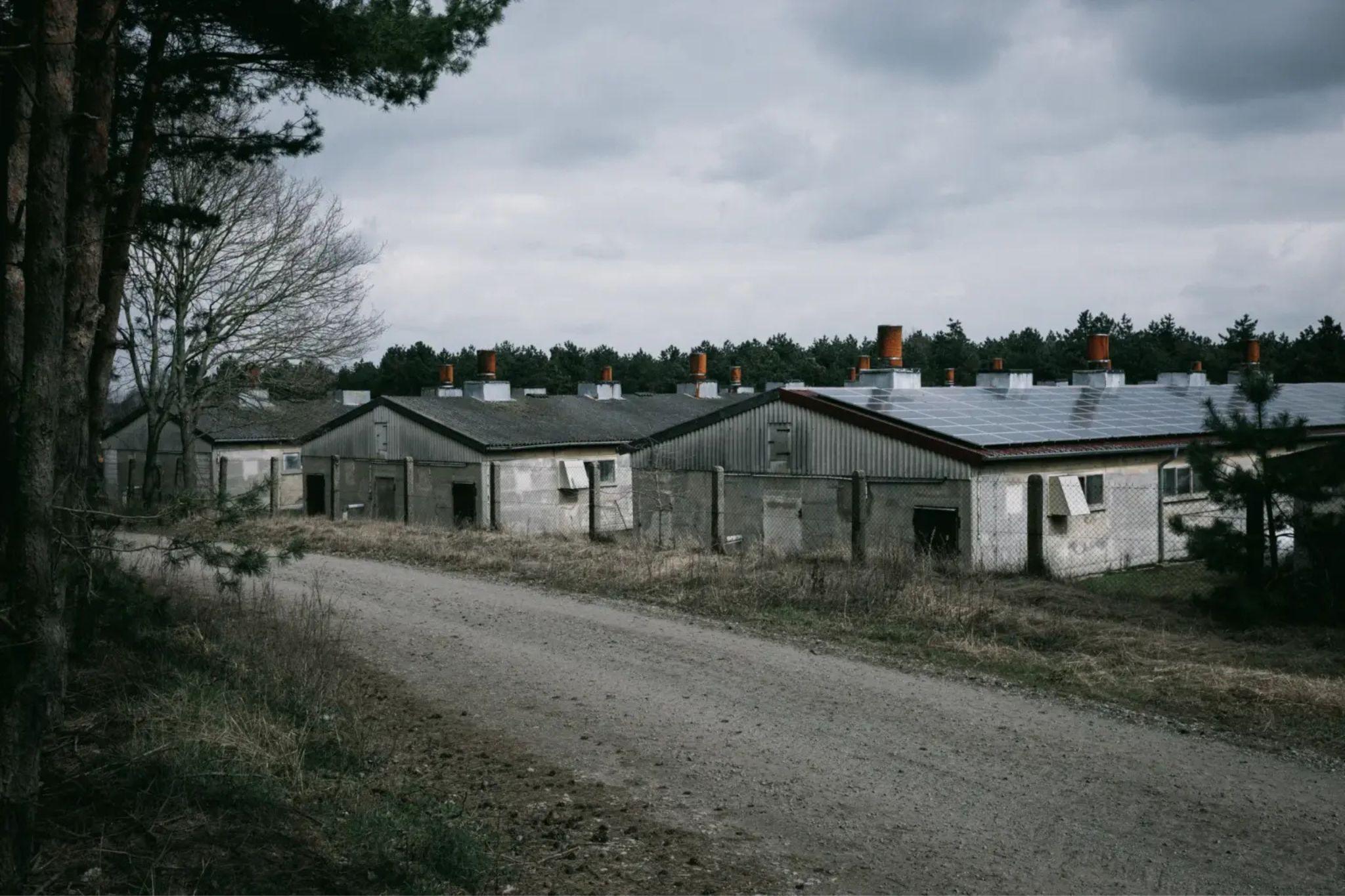
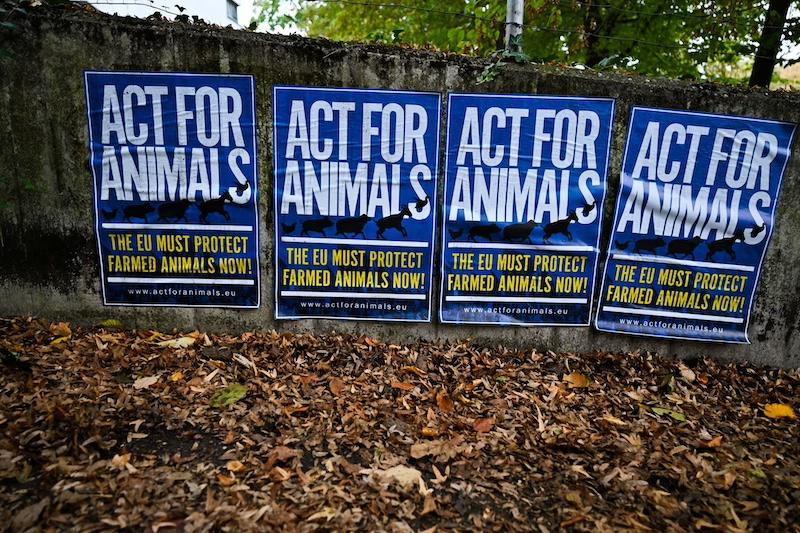
Credit: Animal Society.
The Challenge: Why Has Reform Been Stalled?
Despite growing public support and scientific consensus for stronger animal welfare standards, meaningful reform at the EU level has stalled since late 2023. This impasse results from five key factors that have created a perfect storm of resistance to change.
1. United Industry Opposition to Environmental Policies
The meat, fertilizer, and pesticide industries have coordinated a strong campaign against the European Green Deal, particularly targeting the Farm to Fork Strategy and animal welfare revisions. These industries have funded their own impact studies to challenge scientific findings, engaged in aggressive lobbying, and launched media campaigns to influence policymakers. The meat, fertilizer, and pesticide industries have coordinated a strong campaign against the European Green Deal, particularly targeting the Farm to Fork Strategy and animal welfare revisions. These industries have funded their own impact studies to challenge scientific findings, engaged in aggressive lobbying, and launched media campaigns to influence policymakers.19, 20, 21, 22
2. Tensions Between Free Trade and EU Import Standards
Tensions persist within the European Commission between trade liberalization and stricter welfare standards, with DG TRADE often viewing welfare requirements as obstacles to trade agreements. The proposed EU-MERCOSUR deal exemplifies this challenge, as increased agricultural imports from countries with lower welfare standards risk undermining EU producers who face higher regulatory costs. The inclusion of “mirror clauses” in free trade agreements are essential to ensure imported products meet EU welfare standards, thereby protecting both animal welfare and fair competition.
3. Institutional Challenges within the European Commission
The European Commission faces structural and resource constraints that limit its capacity to push for animal welfare reforms. The Better Regulation Guidelines require extensive consultation processes and impact assessments that demand significant resources and time.23 Two specific obstacles prevented animal advocacy groups from accessing key decision-makers, and made it challenging to advance evidence-based policies: 1) the political underrepresentation of animal welfare in institutions; and 2) the opacity and complexity of the legislative processes where the European Commission is involved. These barriers created an uphill battle against the strong industry opposition and competing political priorities that stood in the way of positive change for animals .
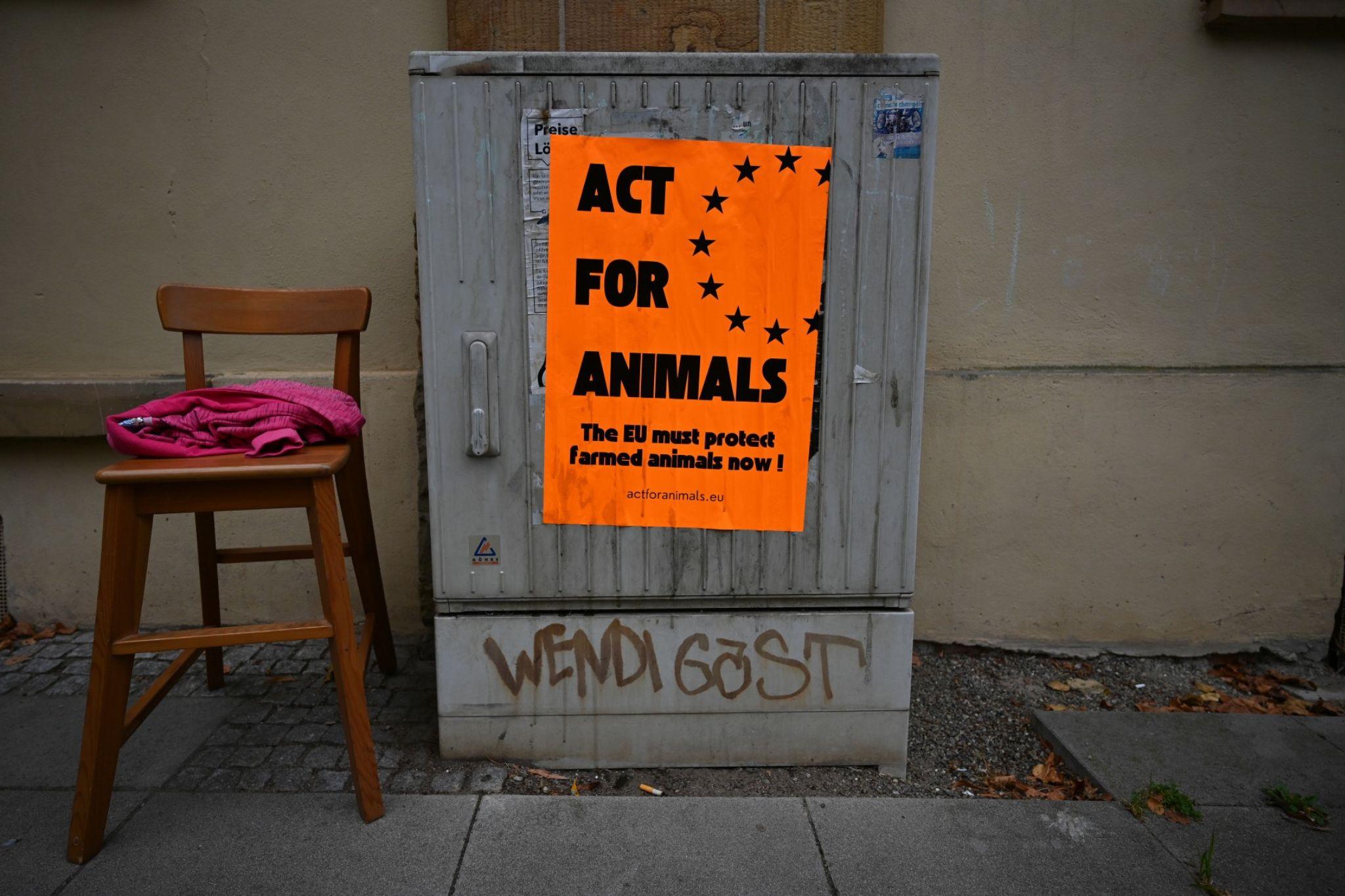
Credit: Animal Society.
4. Adverse Timing: Crises and Elections
The Russian invasion of Ukraine shifted priorities to food security and economic stability. The animal agriculture industry leveraged these events to argue that stricter welfare standards would increase food prices. Facing this shock, the European Commission appears to have frozen, or at least to have stepped back from its commitments for the moment. The timing of the reforms also coincided with European elections, discouraging policymakers from endorsing significant reforms.
5. Structural and Cultural Limitations of the Animal Advocacy Movement
The animal advocacy movement’s financial constraints, with only a small portion of limited resources dedicated to political lobbying. Ideological divisions between animal rights and welfare approaches hinder unified action. Additionally, a portion of the movement’s apolitical or even antipolitical tradition resists engaging with formal institutions.
Understanding these obstacles is the first step to overcoming them. In our next post, we’ll explore the strategic pathways advocates can take to break through this legislative gridlock and deliver real change for Europe’s 300 million caged animals.
Compassion in World Farming. (2024). Food businesses paving the way for a cage‑free Europe. https://www.ciwf.org/resources/reports-position-papers-briefings/food-businesses-paving-the-way-for-a-cage-free-europe/ reddit.com+15ciwf.org+15
Food and Agriculture Organization of the United Nations. (2023). Meat market review: Emerging trends and outlook 2023. https://openknowledge.fao.org/server/api/core/bitstreams/5fcbf357-eac5-4e22-84ce-ec0936d5fb52/content
Ritchie, H., Rosado, P., & Roser, M. (2023). Animal welfare. Our World in Data. https://ourworldindata.org/animal-welfare
Eurostat. (2024). Agricultural production – livestock and meat. European Commission. https://ec.europa.eu/eurostat/statistics-explained/index.php/Agricultural_production_-_livestock_and_meat
European Court of Auditors. (2023). Transport of live farm animals in the EU. https://www.eca.europa.eu/Lists/ECADocuments/RV-2023-03/RV-2023-03_EN.pdf
Humane Society International. (2010). Food safety and cage egg production.
https://www.humaneworld.org/sites/default/files/uploads/assets/pdfs/hsi-fa-white-papers/food_safety_risks_of_cage_egg.pdfEuropean Food Safety Authority. (2023). Info session on the welfare of ducks, geese and quail. https://www.efsa.europa.eu/sites/default/files/2023-05/infosession-23-may-2023-ducks-geese-quail.pdf
Animal Policy International. (2024). Applying the UK’s Animal Welfare Standards to Imports. https://www.animalpolicyinternational.org/applying-the-uk-animal-welfare-standards-to-imported-products
Animal Society. (2024). Act for animals.
https://www.actforanimals.eu/Eurogroup for Animals.(2025). Forward for animals.
https://www.eurogroupforanimals.org/forward-animalsL214. (2025). Uncage the law.
https://uncagethelaw.eu/European Commission. (2018). End the Cage Age initiative.https://www.endthecageage.eu/
European Commission. European Citizen’s initiative.
https://citizens-initiative.europa.eu/_enEuropean Commission. (2019). The European Green Deal. https://ec.europa.eu/info/strategy/priorities-2019-2024/european-green-deal_en
European Commission. (2020). Farm to Fork Strategy. https://ec.europa.eu/food/farm2fork_en
CIWF (2024). End the Cage Age initiative.https://www.endthecageage.eu/
European Commission. (2024). Strategic Dialogue on the future of EU agriculture. https://agriculture.ec.europa.eu/overview-vision-agriculture-food/main-initiatives-strategic-dialogue-future-eu-agriculture_en
Holland, N., & Tansey, R. (2022). A loud lobby for a silent spring: The pesticide industry’s toxic lobbying tactics against Farm to Fork. Corporate Europe Observatory. https://www.corporateeurope.org/en/2022/03/loud-lobby-silent-spring
InfluenceMap. (2024, May 29). The European meat and dairy sector’s climate policy engagement. https://influencemap.org/report/The-European-Meat-and-Dairy-Sector-s-Climate-Policy-Engagement-28096
Carter, N. (2024). Harvesting denial, distractions, and deception: Understanding animal agriculture’s disinformation strategies and exploring solutions. Freedom Food Alliance. https://www.freedomfoodalliance.org/thereport
Win, T. L., Neslen, A., Kanter, J., Riva, P., Sapoch, J., Ramalho da Silva, B., Hekman, L., & Pang, T. (2023, October 23). Animal welfare wrecked: How an increasingly assertive meat industry helped derail a historic democratic demand to improve animal welfare standards in the EU. Lighthouse Reports. https://www.lighthousereports.com/investigation/animal-welfare-wrecked/
European Commission. (2023). Better regulation: guidelines and toolbox. https://commission.europa.eu/law/law-making-process/planning-and-proposing-law/better-regulation/better-regulation-guidelines-and-toolbox_en
About Thomas Hecquet
Having grown up on a farm, Thomas has worked within the animal industry for 10 years. Moved by the values of egalitarianism and solidarity, he has been a part of the animal rights movement since 2006, mostly in Germany and France, working in grassroot groups and international organizations. He is now involved in an organization focused on changing laws and institutions for animals: Animal Society and the "Animals in Democracy" network.
ACE is dedicated to creating a world where all animals can thrive, regardless of their species. We take the guesswork out of supporting animal advocacy by directing funds toward the most impactful charities and programs, based on evidence and research.
Join our newsletter
Table of Contents




